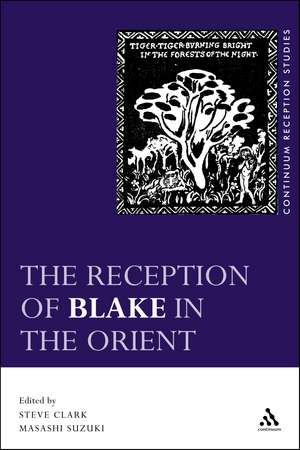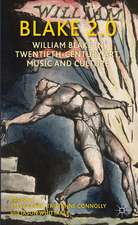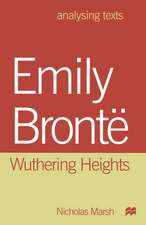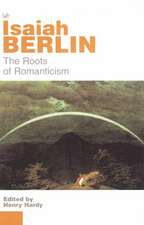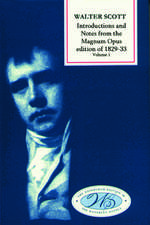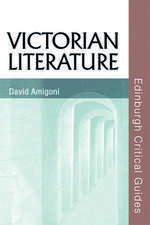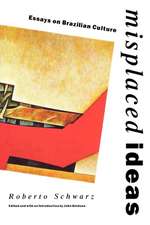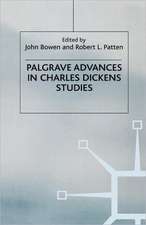The Reception of Blake in the Orient: Continuum Reception Studies
Editat de Dr Steve Clark, Professor Masashi Suzukien Limba Engleză Paperback – 21 dec 2008
| Toate formatele și edițiile | Preț | Express |
|---|---|---|
| Paperback (1) | 498.06 lei 43-57 zile | |
| Bloomsbury Publishing – 21 dec 2008 | 498.06 lei 43-57 zile | |
| Hardback (1) | 1331.96 lei 43-57 zile | |
| Bloomsbury Publishing – 31 mar 2006 | 1331.96 lei 43-57 zile |
Preț: 498.06 lei
Preț vechi: 614.27 lei
-19% Nou
Puncte Express: 747
Preț estimativ în valută:
95.30€ • 99.77$ • 78.86£
95.30€ • 99.77$ • 78.86£
Carte tipărită la comandă
Livrare economică 07-21 aprilie
Preluare comenzi: 021 569.72.76
Specificații
ISBN-13: 9780826438058
ISBN-10: 0826438059
Pagini: 360
Dimensiuni: 156 x 234 x 19 mm
Greutate: 0.51 kg
Editura: Bloomsbury Publishing
Colecția Continuum
Seria Continuum Reception Studies
Locul publicării:London, United Kingdom
ISBN-10: 0826438059
Pagini: 360
Dimensiuni: 156 x 234 x 19 mm
Greutate: 0.51 kg
Editura: Bloomsbury Publishing
Colecția Continuum
Seria Continuum Reception Studies
Locul publicării:London, United Kingdom
Caracteristici
Includes range of international and Japanese contributors, including Shinsuke Tsurumi, one of the leading philosopher in Japan.
Cuprins
List of Illustrations
Notes on Contributors
1 Introduction, Steve Clark (University of Tokyo) and Masashi Suzuki (Kyoto University)
Part I: The Orient in Blake: The Global Eighteenth Century
2 Thel in Africa: William Blake and the Post-colonial, Post-Swedenborgian Female Subject, David Worrall (Nottingham Trent University)
3 'Typhon, the lower nature': Blake and Egypt as the Orient, Kazuya Okada (Okayama University)
4 Rebekah Bliss: Collector of William Blake and Oriental Books, Keri Davies (The Blake Society)
5 Blake and the Chinamen, Mei-Ying Sung (Nottingham Trent University)
6 Colour Printing in the West and East: William Blake and Ukiyo-e, Minne Tanaka
7 Representing Race: The Meaning of Colour and Line in William Blake's 1790s Bodies, Sibylle Erle (Bishop Grosseteste University)
8 Africa and Utopia: Refusing a 'local habitation', Susan Matthews (University of Roehampton)
9 An Empire of Exotic Nature: Blake's Botanical and Zoomorphic Imagery, Ashton Nichols (Dickinson College)
10 Blake, Hayley and India: On Designs to a Series of Ballads (1802), Hikari Sato (Tokyo University)
11 The Authority of the Ancients: Blake and Wilkins' translation of the Bhagvat-Gita, Tristanne J. Connolly (St. Jerome's University, Waterloo)
Part II: Blake in the Orient: Early-Twentieth-Century Japanese Reception
12 Blake's Oriental Heterodoxy: Yanagi's Perception of Blake, Ayako Wada (Tottori University)
13 Self-Annihilation in Milton, Hatsuko Niimi (Japan Women's University)
14 An Ideological Map of (Mis)reading: William Blake and Yanagi Muneyoshi in Early Twentieth-century Japan, Kazuyoshi Oishi (University of the Air)
15 The Female Voice in Blake Studies in Japan, 1910s-1930s, Yoko Ima-Izumi (University of Tsukuba)
16 Blake as Inspiration toYanagi and Jugaku, Shinsuke Tsurumi
17 Individuality and Expression: The Shirakaba Group and the Early Reception of Blake's Visual Art Works in Japan, Yumiko Goto (Kyoto Municipal Museum of Art)
Part III: Blake in the Orient: Later Responses
18 Blake's Night: Tanizaki's Shadows, Jeremy Tambling
19 Oe Kenzaburo's Reading of Blake: An Anglophone Perspective, Barnard Turner (National University of Singapore)
20 Nebuchadnezzar's Sublime Torments: William Blake, Arthur Boyd and the East, Peter Otto (University of Melbourne)
21 William Blake in Taiwan, Ching-erh Chang (National Taiwan University)
22 'Walking thro' Eternity': Blake's Psychogeography and other Pedestrian Practices, Jason Whittaker (University College Falmouth)
23 Blake's Question (from the Orient), John Phillips (National University of Singapore)
Bibliography
Index
Notes on Contributors
1 Introduction, Steve Clark (University of Tokyo) and Masashi Suzuki (Kyoto University)
Part I: The Orient in Blake: The Global Eighteenth Century
2 Thel in Africa: William Blake and the Post-colonial, Post-Swedenborgian Female Subject, David Worrall (Nottingham Trent University)
3 'Typhon, the lower nature': Blake and Egypt as the Orient, Kazuya Okada (Okayama University)
4 Rebekah Bliss: Collector of William Blake and Oriental Books, Keri Davies (The Blake Society)
5 Blake and the Chinamen, Mei-Ying Sung (Nottingham Trent University)
6 Colour Printing in the West and East: William Blake and Ukiyo-e, Minne Tanaka
7 Representing Race: The Meaning of Colour and Line in William Blake's 1790s Bodies, Sibylle Erle (Bishop Grosseteste University)
8 Africa and Utopia: Refusing a 'local habitation', Susan Matthews (University of Roehampton)
9 An Empire of Exotic Nature: Blake's Botanical and Zoomorphic Imagery, Ashton Nichols (Dickinson College)
10 Blake, Hayley and India: On Designs to a Series of Ballads (1802), Hikari Sato (Tokyo University)
11 The Authority of the Ancients: Blake and Wilkins' translation of the Bhagvat-Gita, Tristanne J. Connolly (St. Jerome's University, Waterloo)
Part II: Blake in the Orient: Early-Twentieth-Century Japanese Reception
12 Blake's Oriental Heterodoxy: Yanagi's Perception of Blake, Ayako Wada (Tottori University)
13 Self-Annihilation in Milton, Hatsuko Niimi (Japan Women's University)
14 An Ideological Map of (Mis)reading: William Blake and Yanagi Muneyoshi in Early Twentieth-century Japan, Kazuyoshi Oishi (University of the Air)
15 The Female Voice in Blake Studies in Japan, 1910s-1930s, Yoko Ima-Izumi (University of Tsukuba)
16 Blake as Inspiration toYanagi and Jugaku, Shinsuke Tsurumi
17 Individuality and Expression: The Shirakaba Group and the Early Reception of Blake's Visual Art Works in Japan, Yumiko Goto (Kyoto Municipal Museum of Art)
Part III: Blake in the Orient: Later Responses
18 Blake's Night: Tanizaki's Shadows, Jeremy Tambling
19 Oe Kenzaburo's Reading of Blake: An Anglophone Perspective, Barnard Turner (National University of Singapore)
20 Nebuchadnezzar's Sublime Torments: William Blake, Arthur Boyd and the East, Peter Otto (University of Melbourne)
21 William Blake in Taiwan, Ching-erh Chang (National Taiwan University)
22 'Walking thro' Eternity': Blake's Psychogeography and other Pedestrian Practices, Jason Whittaker (University College Falmouth)
23 Blake's Question (from the Orient), John Phillips (National University of Singapore)
Bibliography
Index
Recenzii
"Blake has, for whatever reasons, been thoroughly taken up by what one of the contributors charitably calls 'the liong and distinguished Japanese tradition of reception.' The poet's 'bright Japan' has proved to be one of his major resting places." - Donald Richie, Japan Times, May 2006
mentioned in The Chronicle of Higher Education June 30, 2006
"This welcome collection of essays has multiple aims. Its introduction sets it squarely amid recent attempts not just to look at origins and contexts of Blake's output but also at the way it has been received and deployed in later times and places. Here those times and places are extremely diverse...the essays on display here are varied and impressive..." - Jon Mee, University of Warwick, for Romanticism and Victorianism on the Net, November 2007
"This book is based on the Conference 'Blake in the Orient', held at Kyoto University, Japan on 29 and 30 November 2003 and though all the papers read there are not printed here the contributors amount to no less than 25...while the variety of contributors and contents makes it rather difficult to give an instant overview, every effort should be made to review these ambitious attempts to form a bridge between East and West in Blake scholarship. According to editors Steve Clark and Masashi Suzuki, it aims to approach current Post-Colonialist issues, among others, how Blake responded to the ideologies of Imperialism...It seeks to overcome insular celebration of the poet as essentially English and consider how his work is assimilated outside Britain and Europe with Japan for its central focus...In Afterword Elinor Shaffer emphasizes the significance of this volume and the Kyoto Conference on Blake, out of which it emerged, as an exemplary record of encounters between east and West for more than 100 years and as 'a permanent reminder of the unpredictable fertility of a major writer, at home and abroad'...This book, as has been hinted, cannot be considered a strictly coherent whole whose parts are closely connected with each other, but rather it consists of essays very difference in tone as well as in content. Instead of being necessarily a negative aspect, however, this reflects Blake's fertility inspiring, to borrow Shafer's words, 'other minds in other times, other words and other image'. We should admire the editors' efforts to organize so diverse materials into a book..." - Akira Fujimaki, Studies in English Literature, No. 49, 2008
mentioned in The Chronicle of Higher Education June 30, 2006
"This welcome collection of essays has multiple aims. Its introduction sets it squarely amid recent attempts not just to look at origins and contexts of Blake's output but also at the way it has been received and deployed in later times and places. Here those times and places are extremely diverse...the essays on display here are varied and impressive..." - Jon Mee, University of Warwick, for Romanticism and Victorianism on the Net, November 2007
"This book is based on the Conference 'Blake in the Orient', held at Kyoto University, Japan on 29 and 30 November 2003 and though all the papers read there are not printed here the contributors amount to no less than 25...while the variety of contributors and contents makes it rather difficult to give an instant overview, every effort should be made to review these ambitious attempts to form a bridge between East and West in Blake scholarship. According to editors Steve Clark and Masashi Suzuki, it aims to approach current Post-Colonialist issues, among others, how Blake responded to the ideologies of Imperialism...It seeks to overcome insular celebration of the poet as essentially English and consider how his work is assimilated outside Britain and Europe with Japan for its central focus...In Afterword Elinor Shaffer emphasizes the significance of this volume and the Kyoto Conference on Blake, out of which it emerged, as an exemplary record of encounters between east and West for more than 100 years and as 'a permanent reminder of the unpredictable fertility of a major writer, at home and abroad'...This book, as has been hinted, cannot be considered a strictly coherent whole whose parts are closely connected with each other, but rather it consists of essays very difference in tone as well as in content. Instead of being necessarily a negative aspect, however, this reflects Blake's fertility inspiring, to borrow Shafer's words, 'other minds in other times, other words and other image'. We should admire the editors' efforts to organize so diverse materials into a book..." - Akira Fujimaki, Studies in English Literature, No. 49, 2008
